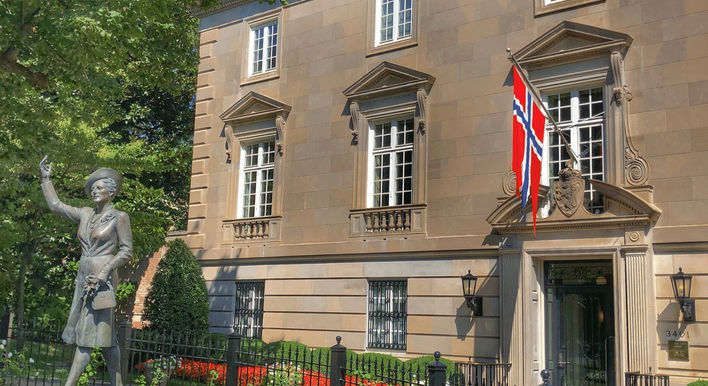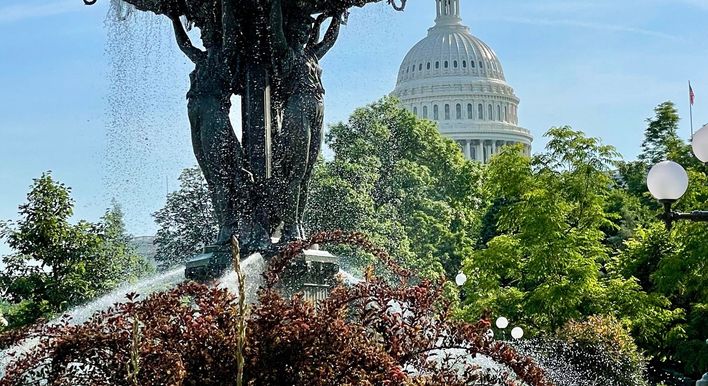Its summertime and whether you’re at the beach or by a lake you may be looking for a good book. So, I thought I’d share with you what I think are some of the best books about Washington, DC.
A tour we think you'll love
At the top of my list is All the President’s Men by the Washington Post reporters who broke the Watergate story, Bob Woodward and Carl Bernstein. Now we all know how the story ends, but it doesn’t keep you from being on the edge of your seat as you read it. Best of all, even though media has changed since this was written in 1974, the way to gather the facts for an accurate story hasn’t and this book shows you how it’s done right. Best of all, many of the places in the book, like the garage where the Deep Throat meetings take place, the Watergate, and the look-out across the street, are on my tours.
Next is Washington Goes to War by David Brinkley. For those of you who remember Brinkley’s on-air presence will hear his somewhat snarky voice in this book. WWII transformed Washington from a sleepy, backwater southern town to one of the most important cities in the world. This book was most influential to me as it started me on the path of learning about the District’s past. I love his stories about this city as it plunges into the modern era.
Advise and Consent by Alan Dury is, I think, the best novel describing the machinations of Capitol Hill. Published in 1959 during the Cold War, it’s the story of a controversial secretary of state nominee who is rumored to have communist sympathies. Throw in a scheming president who’s dying, a ruthless senator, a past homosexual affair, shocking to even write about at the time, and you have a Pulitzer Prize winner. It is a book that has passed the test of time.
This next one is laugh out loud funny. Thank You for Smoking is a dark political satire by Christopher Buckely, son of the conservative icon William F. Buckely, about a lobbyist who promotes cigarette smoking. He and his friends from the alcohol and firearms industries call themselves the MOD squad. MOD standing for merchants of death. In a strange way it does show how the lobbying industry can operate. And when the main character is kidnapped and covered with nicotine patches, hilarity ensues. While it does show how lobbying works, you’d be mistaken to think all lobbyist were bottom feeders like these characters.
Personal History by Katherine Graham, the late publisher of the Washington Post is a real gift. She tells how her family acquired the Post and how her father willed it to her husband since he just assumed that a woman couldn’t handle the job. She talks honestly about her husband’s mental illness and suicide, taking over as publisher, and despite being rich, knowing nothing of money. Since so much of her personal life is history she writes about the Kennedys, Bob McNamara, LBJ, Reagan, supreme court justices, and a host of others. Best of all it gives you a glimpse of Washington when Georgetown was still the center of social and political life.
Lost in the City by Edward P. Jones has nothing to do with politics or power, but everything to do with everyday life of the folks who live in the District. In this collection of short stories Jones takes you on a journey of the joys and sorrows in a small section of the city. And as you read you visualize the places you know, and wonder about those to which you’ve never been. But as I read it, I felt sad. It’s written in 2005 and you see the love these characters have for their neighborhoods, but you know in the coming gentrification many will lose their homes and the character of the neighborhood will disappear.
Lastly, for a comprehensive history of DC, I recommend Chocolate City A History of Race and Democracy in the Nation’s Capital by Chris Asch and Derek Musgrove. Chocolate City being a nickname for DC coined in the 70s when it was a majority Black town. They start with the Nacostines, the Native Americans who were here long before Europeans showed up and move the design of the city, slavery, riots, the arrival of a Black middle class, home rule, Marion Barry, the control board, and end today as the city becomes wealthier and whiter. At the core of this four-century story is how America’s ideals of democracy collide head-on with both the denial of freedom to the enslaved and voting rights for everyone else. If you want to take a deep DC dive before your visit, this is the book you want.






